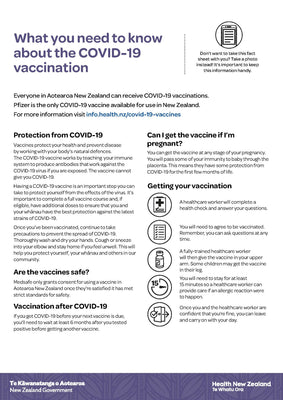What you need to know about the COVID-19 vaccination - HP8590

Fact sheet: What you need to know about the COVID-19 vaccination.
Other vaccines which may be free for you include a flu vaccine, tetanus and whooping cough (pertussis) booster, shingles vaccine, measles vaccine, or HPV vaccine.
The full resource:
Everyone in Aotearoa New Zealand can receive COVID-19 vaccinations.
Pfizer is the only COVID-19 vaccine available for use in New Zealand.
For more information visit info.health.nz/covid-19-vaccines
Protection from COVID-19
Vaccines protect your health and prevent disease by working with your body’s natural defences. The COVID-19 vaccine works by triggering your immune system to produce antibodies that work against the COVID-19 virus if you are exposed. The vaccine cannot give you COVID-19.
Having a COVID-19 vaccine is an important step you can take to protect yourself from the effects of the virus. It is important to keep up to date with your COVID-19 vaccinations to give you and your whānau the best protection.
Once you’ve been vaccinated, continue to take precautions to prevent the spread of COVID-19. Thoroughly wash and dry your hands. Cough or sneeze into your elbow and stay home if you feel unwell. This will help you protect yourself, your whānau and others in our community.
Are the vaccines safe?
Medsafe only grants consent for using a vaccine in Aotearoa New Zealand once they’re satisfied it has met strict standards for safety.
Vaccination after COVID-19
If you get COVID-19 before your next vaccine is due, you’ll need to wait at least 6 months after you tested positive before getting another vaccine.
Can I get the vaccine if I’m pregnant?
You can get the vaccine at any stage of your pregnancy. You will pass some of your immunity to baby through the placenta. This means they have some protection from COVID-19 for the first few months of life.
Getting your vaccination
- A healthcare worker will complete a health check and answer your questions.
- You will need to agree to be vaccinated. Remember, you can ask questions at any time.
- A fully-trained healthcare worker will then give the vaccine in your upper arm. Some children may get the vaccine in their leg.
- You will need to stay for at least 15 minutes so a healthcare worker can provide care if an allergic reaction were to happen.
- Once you and the healthcare worker are confident that you’re fine, you can leave and carry on with your day.
Giving consent for a vaccination
Before having your vaccine, the vaccinator will ask if you give consent. You have the right to make an informed choice about your healthcare including immunisations.
Before giving consent, the vaccinator will explain to you what the vaccine is for, the risks of having the vaccine, and why it is recommended for you. The vaccinator will explain what to expect after your vaccine and how and where to seek help if you have any concerns. You will receive this information verbally and take this fact sheet home. There will be time to have all your questions answered and you can also request an interpreter if you need one.
For more information about giving consent, visit healthnavigator.org.nz/health-a-z/i/informedconsent/
Please let your vaccinator know:
- if you have had myocarditis or pericarditis previously
- if you are pregnant or breastfeeding
- if you have diabetes
- if you are unwell
- if you are on blood-thinning medicines or have a bleeding disorder
- if you have had a severe allergic reaction (anaphylaxis) to any vaccine, medicine or anything else
- if your child is aged under 12 years (they will receive the appropriate vaccine for their age)
- if you have recently had any other vaccinations, including mpox within the last month.
Can I get other vaccinations at the same time?
You can get your COVID-19 vaccine at the same time as most other vaccines. You can ask your vaccinator to check if you are up to date with your vaccinations, as well as your whānau who may be attending your appointment with you. Other vaccines which may be free for you include a flu vaccine, tetanus and whooping cough booster, shingles vaccine, measles vaccine, or HPV vaccine. Ask your vaccinator if you can have these at your COVID-19 vaccination or where else you can access them.
Recording your vaccination
Te Whatu Ora records vaccines administered on a centralised database. This allows appropriate healthcare professionals to access your vaccine history and will help keep you up to date with your vaccinations.
To understand how we protect your privacy when recording vaccinations visit
tewhatuora.govt.nz/AIR-privacy
After your COVID-19 vaccination
As with any vaccine, you may experience some side effects. Most are mild, do not last long and happen in the first few days of having the vaccine. Common side effects may include local injection site reactions (pain, redness, swelling and hardening), headache, feeling tired, nausea and chills.
Myocarditis and pericarditis are conditions which are usually caused by viral infections, but they are also very rare side effects of the Pfizer Covid-19 vaccine. Your vaccinator will discuss the signs and symptoms with you as well as what to do if you experience any of these.
If you have any concerns about your symptoms after your vaccine, talk to your doctor, practice nurse or pharmacist, or call Healthline on 0800 611 116 anytime to get advice.
If you have an immediate concern about your safety, call 111, and make sure you tell them you’ve had a recent COVID-19 vaccination so they can assess you properly.